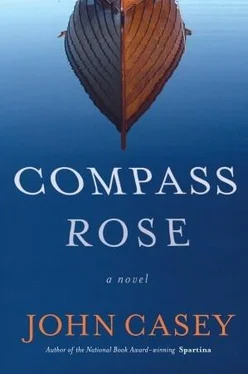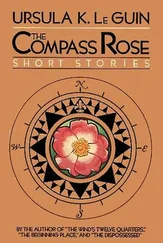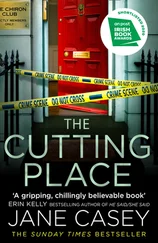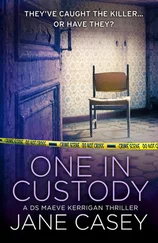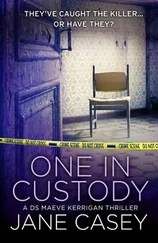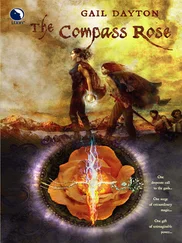Phoebe had distracted her for a moment. May was glad for Eddie, and she tried to hold on to that bit of cheer, but when Phoebe swung round at the end to toot her own horn, May went into the dark again. Elsie, Phoebe — they were like water, water running into everything, wherever there was a crack or a weak spot, they puddied up and then streamed on through. And then no again. If she felt helpless, it was her own fault. If she ducked away whenever she heard Elsie’s name, it was her own fault. No sense in blaming Phoebe for bringing the news about Elsie Buttrick. There might be no end to Elsie Buttrick, but there was no way of knowing about that unless she got out and took Elsie’s measure. Let Elsie know that she and her daughter didn’t live in some other world. Elsie might get herself up in her uniform, she might have the run of Miss Perry’s house, she might play tennis in that bubble at Sawtooth, but she got her daughter out of this family right here.
May said, “That’s good for you and Eddie. You got your work cut out for you, though. There’s usually a good-sized gale about now.”
“Oh, I know,” Phoebe said. “I love summer, I love winter. It’s fall that depresses me.”
May kept from saying “You can’t pick and choose.” She herself liked fall, the hard November fall — the first bite of cold, the trees bare, the spartina in the salt marsh blown into a tangled cover for the part of life that was meant to winter over.
Elsie let Miss Peebles go, kept Sylvia Teixeira on for a couple of hours in the afternoon and Nancy Tran to spend the night. Miss Perry could now use the telephone and even the answering machine. She and Elsie took short walks around the garden and then longer ones up and down the driveway, Miss Perry’s arm in Elsie’s, “ Bras dessous, bras dessus, ” as Miss Perry suddenly remembered.
Miss Perry was now quite fluent. If she got stuck on a word, she flowed around it. One day she asked, “Is there another … another sending our army to fight?”
“War,” Elsie said. “No. Not now.”
And then one day as they were walking, Miss Perry said, “Yes. Shall we go up to your house? I feel quite fit today.”
“I’m afraid it’s a mess.”
“We don’t have to go in.” Miss Perry stopped and freed Elsie. “I am sorry I called you a ragamuffin. These days I can’t say why I say some things. Senseless. The parts of me that ought to keep silent make bubbles that burst. And the things I want to say all too often elude me.” Miss Perry took Elsie’s arm again and started up Elsie’s driveway. “What is odd at my age is to feel oneself as unaccountably changeable as an adolescent. I was reading a simple little poem from A Child’s Garden of Verses . ‘The Lamplighter’—‘O Leerie, I’ll go round at night and light the lamps with you!’—and I began to weep. I read those to Charlie and Tom Pierce when they were little. It may have been that. When I was a child we had an Irish maid of whom I was fond. Possibly that, too.” Miss Perry stopped to readjust her arm in Elsie’s. “On the other hand, some things strike me as funny in a new and peculiar way. At first my snappishness and weeping and laughing made me feel as if I was not myself. Now I suppose I am myself but that my boundaries have shifted, perhaps for the better, in the long run for the better. Though not intellectually.” Miss Perry’s shoulder moved. Elsie wasn’t sure if it was a sigh or a very soft laugh. “Quite the reverse. I fear this will be too grand a comparison, but I have been reconsidering the last days of Rome. The emperors are transient and weak, the senate fearful, the people dwindling. The Huns have come and gone, the walls have been breached and will be soon again. If one’s point of view remains Roman, it is indeed bleak. But there is a great deal going on in Pannonia, Gaul, Iberia, North Africa, even the British Isles. Amazing voyages of tribes, some admirable chieftains. Gibbon is helpful here in his way, but I imagine there is much more than marches and countermarches. Gibbon leaps from battle to battle, pausing only for a plague or a scandal at the Byzantine court. But there are decades and decades of unrecorded life, which I am now imagining as full of the enterprises of unlettered but resourceful people.”
Elsie was astounded.
Miss Perry said, “Did I say that clearly? I may have muddled—”
“No, no, I understand. Rome is your … Rome was your center, your mind. And now your feelings are moving on their own like the barbarians. And you’re changing your mind about the barbarians. Maybe there was more to them …” Miss Perry stood still. She looked at Elsie, her eyes enormous behind the lenses. Elsie said, “I think you’re speaking better than the ninety percent the doctor thought.”
Miss Perry shook her head. “I must confess I rehearsed that speech. I said it aloud when I was alone.”
It was only a few more steps to her house. Elsie felt warmed and confident. She said, “Shall we go in? We can have tea.”
After Elsie opened the door she took Miss Perry’s hand. There was a step down into the main room. She settled Miss Perry on the sofa in full view of the playpen, the baby bottle on the table, the swing set with a padded safety seat. Elsie watched Miss Perry look from one thing to another. She paused at the Exercycle. Elsie said, “Oh. That’s mine.” And then in a rush, as though to another mother, “If Rose is still awake when I want to exercise, I put her in the swing seat and wind it up — it has a spring mechanism that rocks her. And she seems to like the sound of the Exercycle.”
Miss Perry said, “Rose. And where is Rose now?”
“She’s with Mary Scanlon. I usually pick her up about now.”
“But Rose is your child?”
“Yes. I’ve been meaning to tell you, but it was … difficult to know when. I didn’t know … I didn’t want to add another perplexity, but at the same time I thought — and then I knew you remembered.” Elsie took a breath and said, “But mainly I was afraid of what you would think of me.”
Miss Perry sat still. After a while she said, “I’m being quite slow. But I think I would be slow even if I was not … already slow. I am supposing … your last remark leads me to suppose that you are not married.”
Elsie said, “No. Not married.”
“How very difficult. And I’m afraid I have made your life even more difficult. That is the first thing that occurs to me. But you are worried about what I will think of you.” Miss Perry closed her eyes, breathed, opened them. She said, “I never thought you would do as you were told. I knew that much long ago. I admired your spirit. My only worry then was that you would involve other people in your adventures, other people who did not have your resilience. You and I are coming back to me as we were then, and I’m afraid I can’t avoid a schoolmistress sigh. But perhaps the father is as resiliently free as you, and perhaps your daughter will be as well.” Miss Perry rested for several breaths. “Now,” she said. “Now we are friends. There is no justice between friends, as Aristotle has it, which is to say there is no judgment because each one wishes the best for the other.”
Elsie heard this as high-minded iciness. Miss Perry pulling Aristotle out of her hat to remind herself of duty. Elsie had had a spurt of hope — for what? Unqualified forgiveness and sympathy?
When she was alone with Rose she didn’t swing back and forth between anxiety and hope, shame and defiance. She said, “I’ll drive you back. I’ve got to go get Rose.”
They rolled down the hill in silence. Elsie helped Miss Perry out of the car, through the door, and toward the stairs. Miss Perry stopped and said, “I believe I’ll go to the library. Nancy Tran will be here later, will she not?”
Читать дальше
